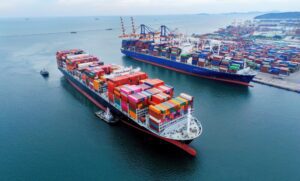Ports across the UK and mainland Europe are becoming increasingly congested as the US-China trade war forces hundreds of vessels to divert or stall, causing widespread disruption in global shipping routes.
The turmoil follows President Donald Trump’s decision to impose a 145 per cent tariff on Chinese imports, prompting a swift retaliation from Beijing with a 125 per cent tax on US goods. As tensions escalate, shipping operators have been left scrambling, with end-customers in the US pulling out of deals and cargo ships rerouted or left in limbo at sea.
According to data from MarineTraffic, the scale of disruption is stark. The first week of April saw a surge in vessel traffic across Europe’s busiest ports. At Antwerp, 226 ships were recorded compared to just 34 during the same period last year. Rotterdam saw 99 ships dock, up from 17 a year ago, while Hamburg recorded 124 vessel calls compared to just 11. Southampton and Barcelona also reported major year-on-year increases, with 51 and 96 ships respectively, far above the 12 and 16 recorded in April 2023.
Industry insiders attribute the spike to cargo being diverted away from transpacific routes as exporters avoid the spiralling cost of sending goods directly between China and the US. The situation is being further inflamed by Washington’s plan to introduce a punitive $1 million docking fee for Chinese-made vessels entering American ports – a significant jump from the usual charges of between $20,000 and $50,000. The proposed levy will apply at every port stop, compounding costs for shipping firms already grappling with increased tariffs.
As Chinese-made ships dominate the global freight sector and are frequently used by Western operators, industry leaders fear the new rules could grind international trade to a halt. One shipping executive warned that companies are being cornered into an impossible choice: pay exorbitant fees to use non-Chinese vessels, or forgo access to the US market entirely.
The uncertainty has already forced businesses to rethink their logistics. One luxury retailer, initially planning to ship goods from China to the US via Europe, reportedly abandoned the final leg of the journey to avoid the new tariff regime, instead opting to store and sell the merchandise in Europe.
Marco Forgione, director-general of the Chartered Institute of Export & International Trade, warned that the influx of rerouted Chinese goods could flood UK and EU markets, offering short-term consumer savings at the expense of domestic manufacturers. “Chinese products are looking for new markets, and the UK and EU would be prime markets for dumping,” he said. “In the short term, there’ll be cost reduction for consumers. But in the medium term, you destroy or undermine your local production capability.”
With growing numbers of ships unable to offload in the US, major shipping companies and oil and gas multinationals are reportedly lobbying the Trump administration to reconsider the new docking fee. The US Trade Representative is expected to release further details later this week.
While weather and industrial action can affect shipping volumes, industry sources insist the surge in activity is directly linked to the ongoing trade war. “Stuff coming out of Asia is being cancelled left, right and centre, or is being diverted to other places,” said one logistics executive. “Genuinely, people are painting pictures where you’ve just got ship after ship waiting outside the US because of the uncertainty.”
As tensions escalate, businesses are warning that the impact could stretch far beyond the shipping sector, disrupting supply chains, inflating costs, and ushering in a new era of protectionist trade.
Read more:
Chaos at European ports as trade war leaves ships in limbo

